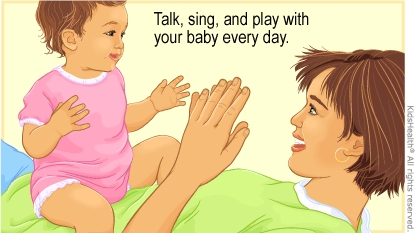To communicate means to share thoughts, ideas, and feelings. We communicate through sounds, words, facial expressions, body language, and touch. Babies this age are starting to understand what some words mean. By their first birthday, they may even say a few words. Talk and sing to your baby and use touch to strengthen the bond between you and help your baby learn to communicate.



You know your baby best. If your baby has signs that concern you, call your health care provider.

How do babies this age communicate? Babies this age are learning to talk as a way to communicate. They babble by making the same sound over and over ("babababa"). They may combine more than one sound when they babble ("ga-ba-da"). They can't talk much yet, so they also communicate a lot through gestures (body movements). They might point to or hold up a toy to show a parent they're having fun. They might shake their head "no" or wave bye-bye.
When do babies start to say actual words? By the end of the first year, your baby might say "mama," "dada," or another word for the first time. When parents show excitement at hearing words, it encourages babies to say more. But remember, babies develop at different rates. Your baby may say their first word earlier or later than their first birthday.